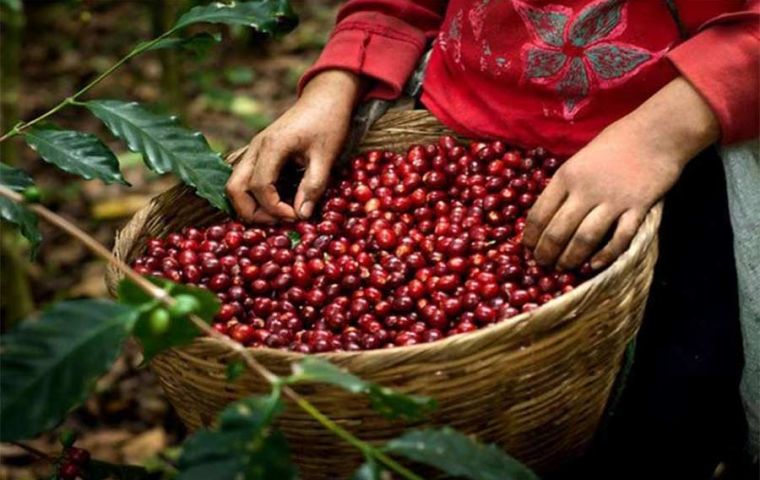MercoPress. South Atlantic News Agency
Colombia foresees stagnant coffee harvests in 2022
 Colombia is prepared for lower prices stemming from a rebound in Brazilian production, Velez said
Colombia is prepared for lower prices stemming from a rebound in Brazilian production, Velez said Colombia's coffee production for the year 2022 will reach 12 million bags, weighing 60 kilos each, according to National Federation of Coffee Growers (FNC) Manager Roberto Velez.
“Magnificent news for coffee producers, but when we see 12 million bags and we rejoice, we remember that not long ago we had 14 and 14.5” million bags of annual production, said the spokesman for the guild that brings together more than 500,000 families.
The drop in local output is linked to climatic factors that directly affect the coffee bush. “The amount of rain that has fallen each month in the last 26 months is higher than what has traditionally fallen,” Velez said.
He also pointed out that poor sunlight affects this type of crop that needs heat to accelerate the ripening process of the grain.
Velez also explained that the bushes need a certain “hydric stress” to reach “their full expression in terms of production.” Permanent rains alter the natural development of the coffee bean.
The other problem facing the industry is the high price of fertilizers globally, which affects food production worldwide since the start of the war between Russia and Ukraine, two of the largest suppliers of urea in the Colombian market.
“The price of gas, which is the raw material for urea, is at high peaks and we do not see that there is going to be a downward movement in the price of that raw material and consequently the price of urea itself does not have to go down”, argued Vélez in an interview published Tuesday.
Regarding fertilizers, Vélez said his guild had already made initial approaches with the new government of Gustavo Petro to boost local production of fertilizers to reduce Colombia's dependence on imports from Europe, the United States, and Asia.
Meanwhile, Brazilian coffee producers expect this year's harvest to be sizeable, thus prompting fears of a price fall due to an abundant offer.
“We will have to wait for August to pass and for September and October to arrive, which is the flowering season, to understand what next year's harvest in Brazil may be,” Velez also pointed out.
He also admitted that the price of coffee grains globally over the past four years has allowed local growers to overcome the economic problems they had been dragging for years. That effect, in addition to the devaluation of the Colombian peso against the dollar, have improved the price of crops.
Velez said that Colombia was prepared for lower prices stemming from a rebound in Brazilian production.
When “the price collapse comes,” Colombian coffee producers will be strong enough not to lower their sale prices. He also foresaw that Colombian coffee would be above the international price.




Top Comments
Disclaimer & comment rulesCommenting for this story is now closed.
If you have a Facebook account, become a fan and comment on our Facebook Page!